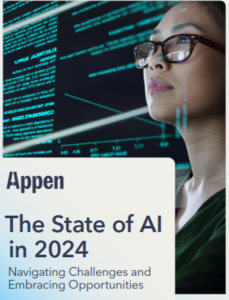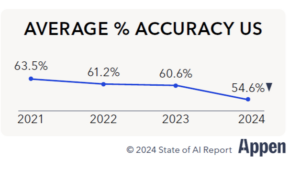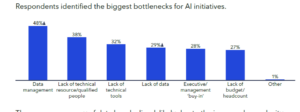(TippaPatt/Shutterstock)
AI could also be a precedence for American companies, however the problem in managing information and acquiring high-quality information to coach AI fashions is turning into a much bigger impediment to attaining AI aspirations, based on the State of AI in 2024 report. of Appen, which was printed yesterday.
AI depends upon information. Whether or not you are coaching your individual AI mannequin, fine-tuning another person’s mannequin, or utilizing RAG strategies with a pre-built mannequin, profitable AI implementation requires bringing information to the desk, ideally plenty of clear, high-quality information.
As a supplier of information annotation and labeling options, Appen has a front-row seat to the information sourcing challenges organizations face when creating or implementing AI options. It has documented these challenges in its annual State of AI reviews, now in its fourth yr.
AI information challenges have reached new lows based on the corporate’s State of AI in 2024 report, which is predicated on a survey it commissioned Harris Ballot to conduct of greater than 500 IT determination makers at U.S. enterprises. early this yr.

You possibly can obtain the Appen State of AI report in 2024 right here
For instance, the common accuracy of information reported by respondents has decreased by 9 share factors over the previous 4 years, based on the report. And information unavailability has elevated by 6 % for the reason that firm launched the State of AI 2023 report.
The drop in high quality and availability could also be resulting from a shift away from easier machine studying initiatives primarily based on structured information towards extra advanced generative AI initiatives primarily based on unstructured information over the previous two years, says VP of Appen technique, Si Chen.
“Now we see lots of information that’s unstructured. It’s not very standardized,” Chen says. BigDATAwire. “They typically require lots of area and material experience to construct these information units. And I feel that is why we see a few of that decline occurring by way of information accuracy. It is just because the information that individuals need and wish immediately is far more advanced information than it was once.”
In its report, Appen additionally noticed an rising bottleneck in terms of AI information pipeline. Firms are striving to achieve a number of steps, whether or not it’s getting access to information, with the ability to correctly handle it, or having the technical assets to work with the information. General, Appen is seeing a ten share level enhance in bottlenecks associated to sourcing, cleansing and labeling information from 2023.
Whereas it is troublesome to establish a single trigger for that decline, Chen theorizes that one of many fundamental causes might be a basic enhance within the varieties of AI initiatives that organizations are embarking on.
“A number of this might be associated to the truth that extra various use instances are merely being designed and developed,” he says, “and every particular use case you design from an enterprise would require {custom} information to really perform and assist.” that use case.”
Appen is a big within the information labeling and annotation house, with almost three many years of expertise. Whereas GenAI is driving a rise within the want for high-quality coaching information proper now, Appen acknowledges that every particular person venture requires its personal distinctive information set for coaching, which is the corporate’s specialty. The numbers rising from Appen’s State of AI report point out that many organizations are combating that.
“There are simply extra various use instances being designed and developed, and each particular use case you design from an enterprise would require {custom} information to assist that use case,” says Chen, who joined Appen a yr in the past after stints working in AI for Tencent and Amazon.
“So all that variety implies that to construct these fashions, that you must ensure you have a extremely strong information pipeline that permits you to configure them,” he continues. “There are a complete collection of steps that revolve round information for every particular person use case. And so, as extra folks implement extra of those fashions, they could be operating into the truth that all of this isn’t essentially mature of their present information pipelines.”
Organizations that developed these information pipelines and expertise to develop conventional machine studying functions on structured information are discovering that growing generative AI functions utilizing unstructured information requires a distinct sort of information pipeline and totally different expertise, Chen says.
“I feel it will likely be a transition interval,” he says. “Nevertheless it’s very thrilling.”
The Appen survey finds that adoption of GenAI use instances elevated by 17% between 2023 and 2024. This yr, 56% of organizations surveyed had GenAI use instances. The preferred use case for GenAI is to extend the productiveness of inner enterprise processes, with 53% share, whereas 41% say they’re utilizing GenAI to scale back enterprise prices.
As GenAI will increase, the share of profitable AI implementations decreases, Appen discovered. For instance, in its 2021 State of AI report, Appen discovered that a mean of 55.5% of AI initiatives have been applied, a determine that fell to 47.4% by 2024. The proportion of AI initiatives which have discovered a “vital” return on funding (ROI) has additionally fallen, from 56.7% in 2021 to 47.3% in 2024.

Appen CEO Ryan Kolln lately appeared on the large information report
These numbers replicate information challenges, Chen says. “Whereas there may be lots of curiosity and persons are engaged on lots of totally different use instances, there are nonetheless lots of challenges by way of attending to implementation,” he says. “And information is enjoying a fairly central function in figuring out whether or not one thing might be applied efficiently.”
In keeping with the report, there are three basic varieties of information that organizations use for AI. Appen discovered that 27% of use instances use pre-labeled information, 30% use artificial information, and 41% use custom-collected information.
The power to make use of custom-collected information that nobody has seen earlier than gives a robust aggressive benefit, Appen CEO Ryan Kolln mentioned in a latest look within the Large Information Debrief.
“There may be lots of information publicly accessible and each mannequin builder consumes it,” he mentioned, “however the true aggressive benefit of generative AI is the flexibility to entry personalised information. What we’re seeing is a really aggressive strategy to discover personalised information. and we’re seeing that real-world information collected by people is a vital a part of that information corpus.”
You possibly can learn the state of Appen AI in 2024 right here.
Associated articles:
Appen says information sourcing stays a serious hurdle for AI
Firms are betting on AI, based on an Appen examine
AI, information availability, information bottleneck, information problem, information administration, information pipeline, information high quality, GenAI, Ryan Kolln, Sure Chen, State of AI 2024, State of AI Report



